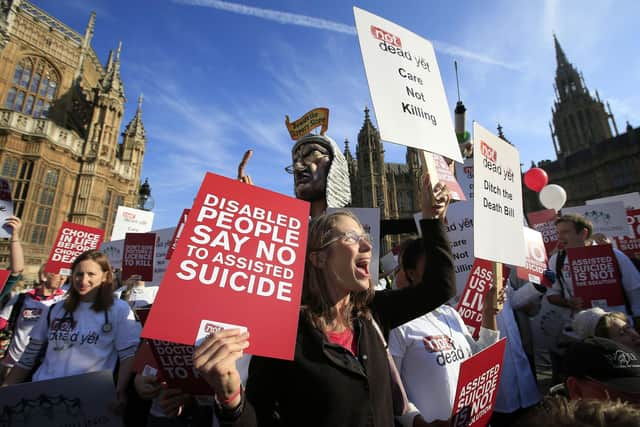Assisted dying: 30 people from Yorkshire had an assisted death at Switzerland's Dignitas centre, new figures suggest
New research outlines where people attending the assisted dying centre in Switzerland have travelled from, including 30 Yorkshire people over the past two decades.
Campaign group the Assisted Dying Coalition has warned over the "inadequacy and disparity" of the current system, calling on UK lawmakers to show more compassion.
Advertisement
Hide AdAdvertisement
Hide AdMore affluent local authorities see higher rates of individuals going abroad, the report appears to suggest, while those without access to airports often see fewer assisted deaths.


Nathan Stilwell, assisted dying campaigner for Humanists UK, said cost of travel shouldn't be a factor when it comes to someone's decision about their death.
"This report clearly shows that the UK’s assisted dying law is broken, brutal and barbaric," he said.
"Having a postcode lottery to end suffering, and an unequal system, where only the rich and physically able can take advantage, is absolutely wrong.
Advertisement
Hide AdAdvertisement
Hide Ad"Adults of sound mind, who are intolerably suffering from a physical, incurable condition deserve the freedom and right to have a dignified end-of-life choice on their own terms."
The report highlights data on the types of cases that go abroad, showing that many who make this decision suffer from neuro-degenerative conditions.
Some of them would not yet be classed as terminally ill, campaigners say, arguing that eligibility criteria under any laws should be based on suffering and not months left to live.
In 2008, a documentary on Sky Television called Right To Die? showed Craig Ewert, a retired university professor from Harrogate who suffered from MND, end his life aged 59.
Advertisement
Hide AdAdvertisement
Hide AdIn England, assisted dying is illegal and punishable by up to 14 years in prison. Although prosecutions remain low, some families have faced interrogation.
There are a number of families across Yorkshire who have faced difficult decisions over recent years, and campaigners for change who used their voice to challenge politicians and lawmakers.
Yorkshire's Debbie Purdy was one of the most high profile of campaigners. Diagnosed with multiple sclerosis (MS), she challenged the law to argue against this threat of consequences for her husband. She died aged 51, at the Marie Curie Hospice in Bradford, in 2014.
And Scarborough businessman Nigel Casson, who travelled to Zurich in 2017, a decade after being diagnosed with MND. The father-of-three was 52 when he died. He had been determined, wife Julie previously told The Yorkshire Post, that he was able to "die happy and while he could still smile".
Advertisement
Hide AdAdvertisement
Hide AdThe Assisted Dying Coalition is a group of organisations working in favour of legal recognition of the right to die, for individuals who have a "clear and settled wish" to end their life and who are terminally ill or facing incurable suffering.
Today's report highlights data on who has travelled to Dignitas, including 12 people from North Yorkshire, eight from the East Riding, and seven from West Yorkshire. From South Yorkshire, a further three people have taken the decision.
Mr Stilwell said it is always a difficult decision for people, not least because of family and loved ones they leave behind.
"People who go to Dignitas are in a very difficult position," he said. "They must be well enough to be able to travel, but unwell enough to fit the criteria.
Advertisement
Hide AdAdvertisement
Hide Ad"A lot of people have conditions where they know they will be suffering for weeks or months or years, and that is why they have chosen to take this difficult decision.
"It is difficult. It is about agency - people want to have control over their deaths. It does appear to be more affluent people and areas," he added. "Clearly it's a very unequal system.
"It's barbaric that we force UK citizens to leave their homes, family and friends, to go to a foreign city just to have this choice at the end of their lives."